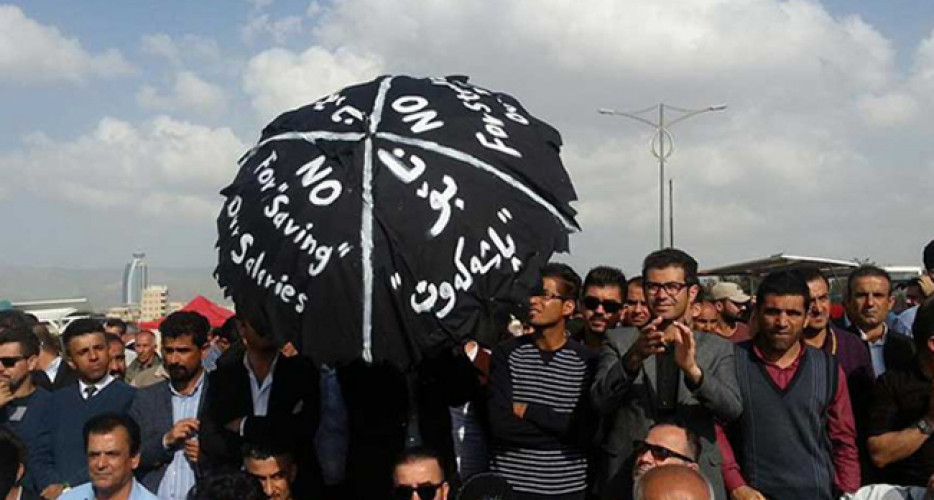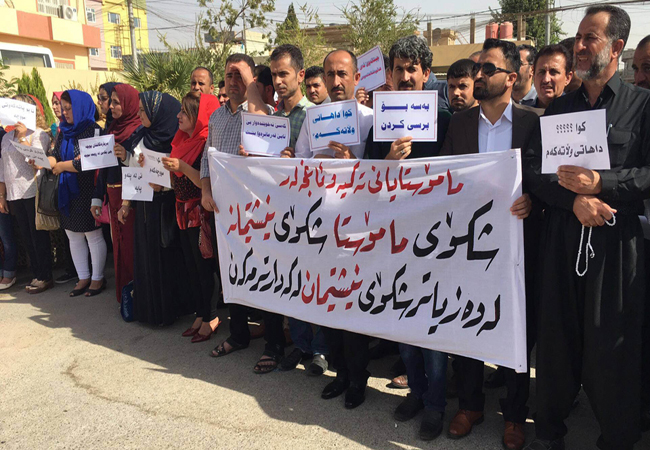
Peregraf - Aza Ibrahim
Rebwar Muhammad has spent half of his life as a teacher, but has never felt as tired as the last three years due to unfavourable governmental measures.
Up to last spring, most of their days were spent on the streets, protesting against austerity measures introduced by the Kurdistan Regional Government (KRG).
Austerity measures were first introduced early in 2016, slashing the salary of the public sector employees by 25 to 70 per cent, which were later amended to 10 to 30 per cent.
KRG has said to save the cut portions of the salaries for public workers and to be given at a later time when the financial crisis is over.
Muhammad told Peregraf, "65 per cent of my salary has been saved, and KRG owes me around 27 million dinars (around 22500 dollars)."
His salary stood at around one million Iraqi dinars (800 dollars) prior to the austerity measures, now it is less than 500 thousand dollars (less than 400 dollars) by cutting 65 per cent.
"The decision was unconceivable among teachers," Muhammad, 45, said, "The financial crisis imposed on teachers has affected the level of education throughout the years."
KRG cited many reasons when it first introduced the measures: financial crisis, the decrease in oil pricing and the federal government's decision not to allocate KRG its due budget owing to their different stands on oil exports, along with the costs incurred during the Islamic State (ISIS) war, and the influx of refugees to the region.
Ahmed Kirkuki, a member of the Teachers Defense and Protection, part of the Teachers Union, believes the situation to be different now, claiming KRG has no more excuses to go on with its austerity measures.
Political parties have been negotiating the formation of a new cabinet in the Kurdistan Region three months after the conclusion of parliamentary elections, with no effect in sight.
Kirkuki spoke to Peregraf, "We've filed several memos to the government to end the austerity measures. If they are honest, the measures will end in 2019."
If KRG fails to deliver on the promise, he warned, the teachers will resort to massive protests and to the collective boycott of schools.
Public sector employees, mainly teachers, have often held large gatherings since 2016, especially in Sulaimaniyah province and sometimes in Duhok.
Muhammad said students had missed one of the two terms of each annual school year, "which affects the education level".
Muhammad, also a member of the Aggrieved Teachers Council, said the possibility for a boycott is still wide open, "KRG is a party-managed entity, without any role for legal institutions," he added, "We want the political parties to fulfil their promises [in this regard], and we are waiting for the new cabinet."
The last review to the austerity measures was in March 2018, where KRG decided to lower the threshold of the salary cuts when the protests turned broader.
The cut decreased to 60 per cent for higher wages, and those who have lesser than 400 thousand Iraqi dinars (around 375 US dollars per month) were relieved from the system.
KRG Minister of Finance, Rebaz Hamlan, said in December 2018 that there is "good hope" that the austerity measures would diminish significantly if not entirely.
He cited negotiations with Baghdad for outstanding financial dues.
However, experts are not that optimistic.
Ahmed Tahir, an economic expert, said, "There is a possibility that 2019 might be even worse than 2018 financially, as the KRG's economic problems are huge without a hope for a solution."
The only way, he told Peregraf, is for KRG to implement whatever conditions Baghdad might impose, to pay KRG's financial dues.
Baghdad's conditions for KRG include the handover of oil revenues to the State Oil Marketing Company (SOMO). However, Erbil has rejected it.
Tahir said the new cabinet could not simply resolve the outstanding matters, "KRG is in debt, indebted to public sector employees, contractors, oil companies, Turkey, along with the damage caused to all the sectors of the economy."
KRG is indebted to the tune of 6 billion dollars to its workers, he said, and up to now, it is not ready to remove the austerity measures.

The markets fall behind, and people suffer from the shortage of many necessary daily items. Most people seek to find second or third part-time jobs only to earn enough to survive.
Teachers have become taxi drivers, restaurant workers and shop owners. Muhammad said some domestic issues have cropped up due to the measures, including divorce. More than 500 teachers have left their jobs entirely.
The Teachers Union filed a project to KRG and the parliament to pay back the saved money it has kept from the teachers. Kirkuki said the project suggests payment in the form of services, relieving from taxes or government loans.
KRG has often promised to pay back the teachers, and all other public workers.
The measures have even affected investment, as the director of Economic Development Organization in Kurdistan, Husam Barzinji said they suspended the payment of any loans to teachers and public servants, fearing that they might not being able to repay.
Muhammad said teachers and public workers have not been showing any sign of protest lately, awaiting for the next move by the KRG, "Otherwise, we'll return to the streets and announce further boycotts and strikes."